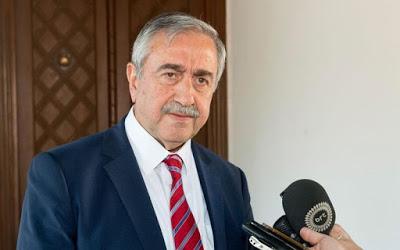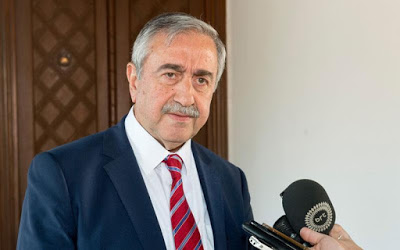The Turkish military will not withdraw completely after a solution, said Turkish leader Mustafa Akinci, but said the Turkish side was not closed to a proposal that would reduce the number of troops to zero in a few years. The Turkish Cypriot leader said that there could be an agreement on the number of the army, adding, however, that with the insistence of the Greek Cypriot side on 'zero guarantees and zero army', there could be no discussion. On the issue of guarantees, Mustafa Akinci said that they submitted a proposal to the e / k side in the context of brain storming, however, because they did not see the necessary opening from the e / k side, they did not proceed. As they said, their proposal is in case the constitutional order is threatened and after all the safeguards are exhausted, the Turkish Cypriots can call Turkey with a decision of their parliament. "If we want a solution we have to find a formula," he said.
Mustafa Akinci rejected EU guarantees, saying that it had been shown in Mont Peléran that the EU could not provide the security that the Turkish Cypriots wanted and that there was no such EU mechanism. Nations after close consultation with Turkey.
The Turkish leader in an interview given tonight to the Turkish channel NTV said that the issue of security and guarantees is not only the sensitivity of Ankara but also of the Turkish Cypriots. "There are two issues, one is security and the other is the maintenance of the regime and the Turkish Cypriots do not want to entrust the security and maintenance of constitutional order to foreign powers"
He said that adapting the security and guarantees system to 2017 "means meeting and discussing". "We submitted such a model to the e / k side in the context of brain storming but because we did not see the necessary opening from the e / k side, we did not proceed," he said. He said that they propose that in case they are led again to a situation like in 1963 and all the safeguards are exhausted "as a last resort the Turkish Cypriots with a decision that will go through their own parliament to take advantage of the power of Turkey and call Turkey".
Asked about the withdrawal of the Turkish army, the Turkish leader said that the Turkish army will not withdraw completely and that a certain number of troops will remain. He did not rule out the possibility of an agreement being called a Friendship Pact, as proposed by Greece. "You can call it a Friendship Pact, but there I am referring to a friendship agreement between Greece, Turkey and the Republic of Cyprus to prevent the external threat. "But I am referring to guarantees. This is something different," he said.
He stated that in the past the Turkish Cypriots did not have a separate police force. "However, now with the new system, each state will have its own area. Our own separate parliament, administration, and courts as well as our own special police. Therefore we will ensure our internal security ourselves there. There will also be a federal police force which will be equal and will consist of 50-50 between T / C and E / C. These are issues that have been agreed. However, if the constitutional order is endangered, what can be done? "The right of our state to intervene should be given to Turkey, but we should make this call when we are in danger," he said, adding:
"At the moment, they are accepting zero army, zero guarantees and we cannot accept that. So two days of technical work was done in Mont Peléran and there these questions were asked and what came out of there is clear. The EU cannot guarantee the security and guarantee that the Turkish Cypriots want. There is no such mechanism in the EU. "
Regarding the number of troops, the T / C leader said that the most extreme position is for the army to withdraw before the solution. "And that is impossible. Those who think logically say that this takes time to do. What we have been told is that within a few years this number of troops will be zero. We are not closed to this. After all, there is no reason for these 40 soldiers to stay there. With the solution there will be a specific reduction of this number. It's clean. There may be agreement on this number. In 1960 the number 650-950 was agreed. A similar number was mentioned by Mr. Erdogan the other day. There may be an agreement on this. This number is not a big issue. It is enough to have an agreement for existence. At the moment, with the attitude of the Greek Cypriot side for 'zero army, zero guarantees', you cannot discuss these. What I am trying to say is that the Greek Cypriots should be more realistic because it is not possible for the Turkish Cypriots to accept this in the referendum. 80% of Turkish Cypriots want to see security from Turkey. How do we do that; How will we adjust it so that the Greek Cypriots can accept it? This is what I am looking for. Turkey sees this positively. "There is also in Mr. Tsavousoglou's statements what I often say, that we want the security of one side but on the other we do not want it to be a threat to the other", he said and added: "If we want a solution we are obliged to find a formula" .
Asked about the territorial issue, the Turkish Cypriot leader said that this is also one of the sensitive issues for this and was left last. He stated that with the agreement of December 11, 2014, all these chapters are interconnected, adding that the Greek Cypriots supported the issue of guarantees to be discussed after all other issues are discussed. "They wanted to disconnect the territorial and other chapters. To put Turkey and the Turkish Cypriots under international pressure to accept their own ideas. This was not happening. We now discuss it by linking it to the other chapters. "Now we are at a point where 8-10 points of the six chapters go in parallel," he said.
Specifically for the territorial, he said that the Greek Cypriot side submitted a map that the Turkish Cypriot side could not accept. "They had excessive demands. I believe that a compromise can be very close to the basis we envisage because the map (of the e / k side) is not realistic. No Turkish Cypriot can accept this map. At the moment, their map has not been submitted to us, nor ours to them. We saw the map very little, for 5-10 minutes. The UN expert looked to see if they met the criterion of the percentage we agreed on, those of 28,2% and we of 29,2%, he said ok and was locked. He will stay there. Both were rejected. This is a percentage agreed upon years ago, by the period of Perez de Cuéllar and Rauf Denktash. That is, the percentage of 29,2% is not a percentage that was mentioned only by Rauf Denktash but went to the 'parliament' and was approved by all the parties ", said the T / C leader.
Regarding the map submitted by the Turkish side, Mr. Akinci said that they worked with his experts on 25 different versions. "This map was submitted to the UN after close consultations with Turkey. We are especially in constant consultation with the Turkish Foreign Minister, especially because Turkey's support for the solution of the Cyprus problem is very important. "Our fate is common and in case of a solution, I estimate that Turkey will also benefit a lot," he said. Mr. Akinci also demanded that the map not become material for internal consumption. "Criticisms of the press selling Cyprus are unfair both for us and for the (Turkish) government here," he said.
Asked about the rotating presidency, the Turkish Cypriot leader said that if the Cyprus issue is resolved, the position of the Greek Cypriots on this issue will be positive. "Rotation is one of the things without us. "A plan that does not contain this, Mustafa Akinci will not go to a referendum," he said, adding that the other important thing is effective participation in decisions. "For example, how will decisions be taken in the Council of Ministers? "The Turkish Cypriots will definitely participate," he said.
Asked if the Turkish Cypriots will have a veto, the Turkish Cypriot leader said: "They (the Greek Cypriots) perceive it as a veto while we do not perceive it as a veto. We perceive it as participation. To be able to make decisions with our participation. As in 1960 in the case of the President and Vice-President, so now in matters of defense, foreign policy and security the decisions will apply in case the two Presidents - E / k and T / k- will take decisions with it. The President will be depending on the case of E / k and the Vice President of T / C, and depending on the case the President of T / C and the Vice President of E / k. For the Ministerial, we convinced for the first time to be 7 to 4 ", he said.
Asked to comment on criticisms against him that he is ready to accept a large number of E / K returns and that this will upset the population balance in the north, Mr. Akinci said that an E / K will be able to settle in the north and the same T / C in Paphos. "Those who will go will not have political rights? No. "Only 20% will be able to have a legal residence permit and will have the right to participate only in local elections." He answered another question that the Greek Cypriots are asking for land to which up to 90 thousand Greek Cypriots can return. "They set it as a criterion at the table in Mont Peléran and we did not accept it. "Our map is not in this context," he said.
Asked if there would be a solution in 2017, the Turkish leader said that "it is the last effort of our generation. I can say that this is the last chance for the reunification of the island in the name of a federation ".
Source: KYPE

